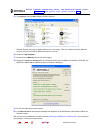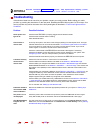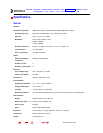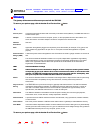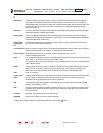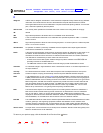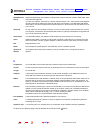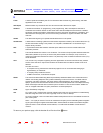
136 SBG1000 User Guide
Home
X
ExitPrint
Overview Installation Troubleshooting Contact FAQ Specifications Glossary License
Configuration: Basic Gateway TCP/IP Wireless Print Server USB
Glossary
This glossary defines terms and lists acronyms used with the SBG1000.
To return to your previous page, click the Acrobat Go to Previous View button.
A
To return to your previous page, click the Acrobat Go to Previous View button.
access point A device that provides wireless LAN connectivity to wireless clients (stations). The SBG1000 acts as a
wireless access point.
adapter A device or card that connects a computer, printer, or other peripheral device to the network or to
some other device. A wireless adapter connects a computer to the wireless LAN.
address
translation
See NAT.
ALG Application level gateway triggers are required by some file transfer (for example, FTP), game, and
video conferencing applications to open one or more ports to enable the application to operate
properly.
American Wire
Gauge (AWG)
A standard system used to designate the size of electrical conductors; gauge numbers are inverse to
size.
ANSI The American National Standards Institute is a non-profit, independent organization supported by
trade organizations, industry, and professional societies for standards development in the United
States. This organization defined ASCII and represents the United States to the International
Organization for Standardization.
ANX Automotive Network Exchange
ARP Address Resolution Protocol broadcasts a datagram to obtain a response containing a MAC address
corresponding to the host IP address. When it is first connected to the network, a client sends an ARP
message. The
SBG1000 responds with a message containing its MAC address. Subsequently, data
sent by the computer uses the
SBG1000 MAC address as its destination.
ASCII The American Standard Code for Information Interchange refers to alphanumeric data for processing
and communication compatibility among various devices; normally used for asynchronous
transmission.
asynchronous
timing
The SBG1000 uses synchronous timing for upstream data transmissions. The CMTS broadcasts
messages that bandwidth is available. The
SBG1000 reserves data bytes requiring x-number of
mini-slots. The CMTS replies that it can receive data at a specified time (synchronized). At the
specified time, the SBG1000 transmits the x-number of data bytes.
attenuation The difference between transmitted and received power resulting from loss through equipment,
transmission lines, or other devices; usually expressed in decibels.
authentication A process where the CMTS verifies that access is authorized, using a password, trusted IP address,
or serial number.
authorization Part of the process between a CMTS and the cable modem or gateway to enable Baseline Privacy.
auto-MDIX Automatic medium-dependent interface crossover detects and corrects cabling errors by automatically
reversing the send and receive pins on any port. It enables the use of straight-through wiring between
the SBG1000 Ethernet ports and any computer, printer, or hub.
Glossary
This glossary defines terms and lists acronyms used with the SBG1000.
To return to your previous page, click the Acrobat Go to Previous View button.
A
To return to your previous page, click the Acrobat Go to Previous View button.
access point A device that provides wireless LAN connectivity to wireless clients (stations). The SBG1000 acts as a
wireless access point.
adapter A device or card that connects a computer, printer, or other peripheral device to the network or to
some other device. A wireless adapter connects a computer to the wireless LAN.
address
translation
See NAT.
ALG Application level gateway triggers are required by some file transfer (for example, FTP), game, and
video conferencing applications to open one or more ports to enable the application to operate
properly.
American Wire
Gauge (AWG)
A standard system used to designate the size of electrical conductors; gauge numbers are inverse to
size.
ANSI The American National Standards Institute is a non-profit, independent organization supported by
trade organizations, industry, and professional societies for standards development in the United
States. This organization defined ASCII and represents the United States to the International
Organization for Standardization.
ANX Automotive Network Exchange
ARP Address Resolution Protocol broadcasts a datagram to obtain a response containing a MAC address
corresponding to the host IP address. When it is first connected to the network, a client sends an ARP
message. The
SBG1000 responds with a message containing its MAC address. Subsequently, data
sent by the computer uses the
SBG1000 MAC address as its destination.
ASCII The American Standard Code for Information Interchange refers to alphanumeric data for processing
and communication compatibility among various devices; normally used for asynchronous
transmission.
asynchronous
timing
The SBG1000 uses synchronous timing for upstream data transmissions. The CMTS broadcasts
messages that bandwidth is available. The
SBG1000 reserves data bytes requiring x-number of
mini-slots. The CMTS replies that it can receive data at a specified time (synchronized). At the
specified time, the SBG1000 transmits the x-number of data bytes.
attenuation The difference between transmitted and received power resulting from loss through equipment,
transmission lines, or other devices; usually expressed in decibels.
authentication A process where the CMTS verifies that access is authorized, using a password, trusted IP address,
or serial number.
authorization Part of the process between a CMTS and the cable modem or gateway to enable Baseline Privacy.
auto-MDIX Automatic medium-dependent interface crossover detects and corrects cabling errors by automatically
reversing the send and receive pins on any port. It enables the use of straight-through wiring between
the SBG1000 Ethernet ports and any computer, printer, or hub.



